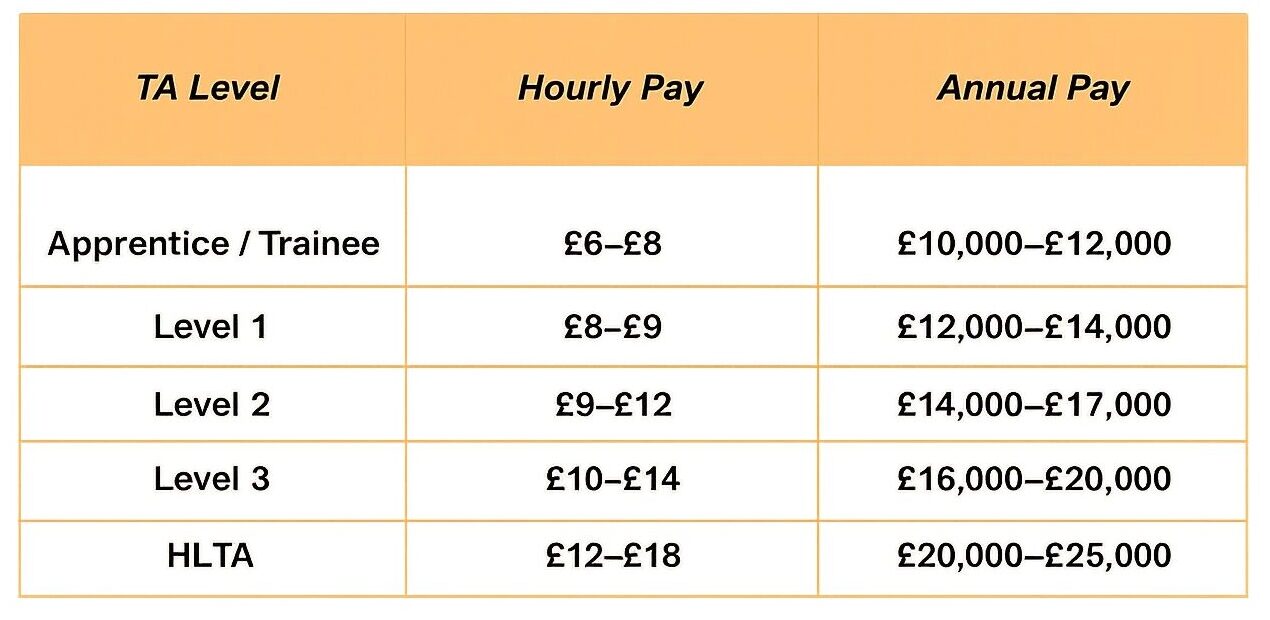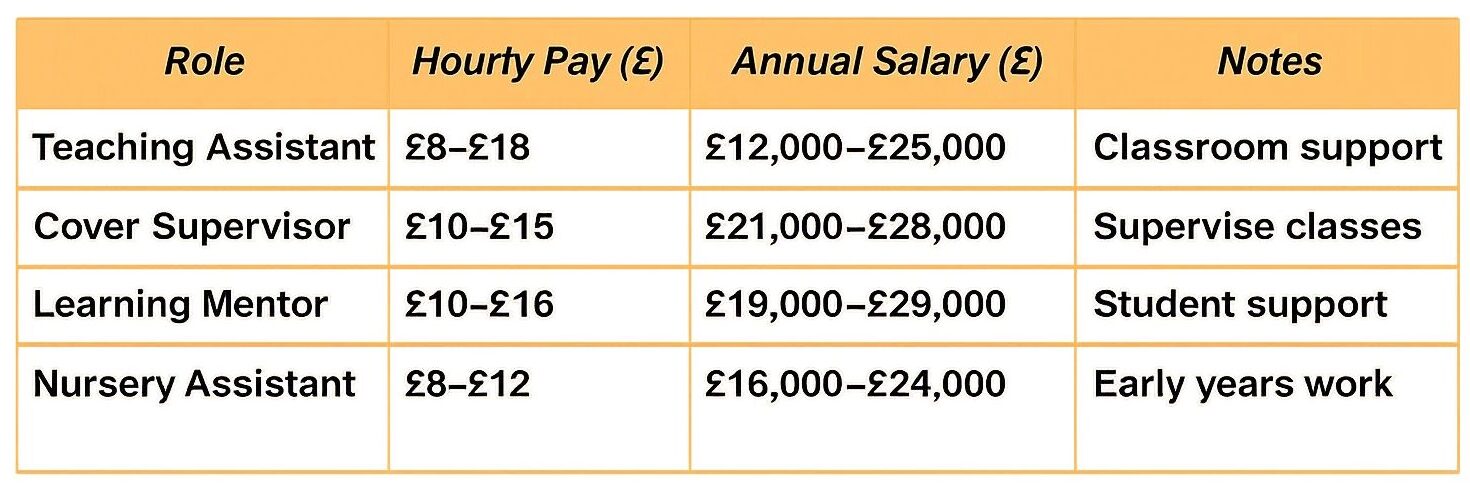Thinking about becoming a teaching assistant but wondering how much you can earn? You’re not the only one! In fact, many people want to know how much do teaching assistants earn per hour before starting this rewarding job. In the UK, TA pay follows the NJC pay scale and changes depending on your level, experience, and location. For example, Level 1–2 TAs usually earn £9–£12 an hour, while Level 3 TAs make £10–£14, and HLTAs can earn up to £18, with London and South East schools often paying more.
In this guide, we’ll show you what affects your pay, ways to boost it, and why your work as a TA really matters.

What Is a Teaching Assistant?
Before we talk about how much teaching assistants earn per hour, it’s important to know what a TA actually does. Once you understand their role, you can see if the pay is really worth it.
What Does a Teaching Assistant Do?
Teaching assistants, or TAs, are the heart of UK classrooms. They help teachers and support pupils every day, making school a better place to learn. For example, they might read with children to boost their skills, or run small group activities to give extra help. In addition, they get the classroom ready by organising materials and displays. Also, every hour a TA spends with students makes a real difference in their learning, and it helps the classroom feel calm, happy, and organised.
Key Roles and Responsibilities
TAs do lots of different things to keep the classroom working well:
- Classroom Support: Help pupils follow lessons and stay focused.
- Special Educational Needs (SEN): Give one-to-one help to students who need extra support.
- Behaviour and Care: Keep the class calm and positive.
- Lesson Prep: Organise materials and set up the classroom.
- Teacher Support: Take notes, supervise breaks, and help manage small groups.
The more a TA does, the more their pay can grow — so knowing what they do helps you understand why the salary is set the way it is.
How Much Do Teaching Assistants?

Teaching assistants’ pay in the UK depends on level, experience, skills, and location. Generally, most TAs get paid by the hour, but it can also be thought of as an annual salary. For example, many TAs work term-time only, which means holidays off, while full-time TAs work all year and earn a bit more. Also, pay follows the NJC pay scale, so schools have clear rules for what you should earn.
Level 1 Teaching Assistant Pay
Level 1 TAs usually start their careers by helping out in the classroom. They earn about £8–£9 per hour, which works out to roughly £12,000–£14,000 per year. As you gain experience and take on more tasks, your pay can go up. Also, schools in London or the South East often pay a little more because of the higher cost of living. Starting as a Level 1 TA is a great way to get your foot in the door and see if this rewarding job is right for you.
Level 2 Teaching Assistant Pay
Level 2 TAs are usually entry-level, starting out in their careers. They earn about £9–£12 per hour, which is roughly £14,000–£17,000 per year. As you gain experience, or take on more responsibilities, your pay can go up. Plus, working in London or the South East usually means higher pay.
Level 3 Teaching Assistant Pay
Level 3 TAs have more training and extra responsibilities, like leading small groups. They earn around £10–£14 per hour, or £16,000–£20,000 per year. In addition, having special skills, such as SEN support, or working in a bigger city can increase your pay further.
Higher Level Teaching Assistant Pay
HLTAs are senior TAs who can cover full lessons and train other staff. They earn £12–£18 per hour, which is about £20,000–£25,000 annually. Furthermore, schools in London and the South East often pay extra because of the higher cost of living.

What Affects Teaching Assistant?
Several things can change how much a teaching assistant earns in the UK. Knowing these factors helps you understand why salaries differ and how you can earn more.
Qualifications and Experience
Your pay depends a lot on your qualifications. For example, Level 2 TAs usually need GCSEs in English and Maths, while Level 3 TAs need an NVQ Level 3 or CACHE Diploma. Also, HLTAs must have a Level 4 qualification. As a result, the more experience you gain, the higher your pay can go. Simply put, the longer you work, the more your hourly and annual pay increases.
Location and School Type
Where you work really matters. For instance, schools in London and the South East usually pay more because living costs are higher. On the other hand, rural schools may pay slightly less. Plus, each school sets pay within NJC rules, so location and school type make a big difference.
Special Skills and SEN Roles
Having extra skills can boost your pay. In addition, TAs with SEN training or specialist knowledge can earn £500–£2,000 extra per year. Skills like helping children with autism, behavioural challenges, or using sign language (BSL/Makaton) make you more valuable and better paid.
Full-Time vs Part-Time / Term-Time Work
Your contract affects total pay. Generally, full-time TAs who work all year earn more, while term-time roles give holidays off but slightly lower annual pay. However, term-time work can be great if you want a better work-life balance.
In short, your TA pay depends on your level, experience, skills, location, and contract type. Even better, by improving your skills and gaining experience, you can climb the pay ladder faster and earn more.
Latest Teaching Assistant Pay Rise News

Teaching assistant pay in the UK keeps changing, so it’s smart to stay updated. For example, in England, Wales, and Northern Ireland, TAs got a 3.2% pay rise for 2025/26, starting from April 1, 2025, thanks to the National Joint Council (NJC). Right now, unions are working on a pay claim for 2026/27, so the next increase isn’t confirmed yet. Most TAs here follow the local government pay scale. Meanwhile, in Scotland, TAs received a 4% pay rise in 2025/26, and another 3.5% increase is planned for 2026/27. So, keeping an eye on these updates helps you plan your career and understand your earning potential as a teaching assistant.
Best Courses to Boost Your Teaching Assistant Salary
If you want to earn more as a TA, taking extra courses can really help. Plus, schools love TAs with extra skills, and many even offer higher pay for trained staff. Here are the key courses that can make a difference:
- Safeguarding – Learn how to keep children safe. Being confident in child protection makes schools trust you more, so your pay can go up.
- Special Educational Needs (SEN) Training – Help children with autism or behavioural challenges. TAs with SEN skills often earn £500–£2,000 extra a year.
- First Aid – Handle emergencies like a pro. Schools value TAs who can act fast, and sometimes this comes with a small pay boost.
- Child Development – Understand how children grow and learn. TAs with this knowledge are often considered for higher pay grades.
- Behaviour Management – Keep the classroom calm and focused. By taking on extra responsibility, you can push your hourly rate higher.
- English & Maths Support – Help pupils improve reading, writing, and maths. Skilled TAs can move into Level 3 or HLTA roles with better pay.
Bottom line: Taking these courses doesn’t just make you a better TA — they can boost your pay, increase your responsibilities, and even help you move toward a teaching career you’ll love.
Teaching Assistant Pay vs Other Education Roles UK

What This Means for You
- Teaching Assistants: A great starting point with room to grow. Pay depends on experience and where you work.
- Cover Supervisors: Keep classrooms running smoothly when teachers are away. Pay varies by school and region.
- Learning Mentors: Help students with behaviour or emotional needs. Your pay can change depending on your school.
- Nursery Assistants: Support little learners in early years settings. Pay depends on location and experience.
Benefits Beyond Pay
Being a teaching assistant isn’t just about the money — there are also great extras that make the job rewarding.
- Pension Perks – Most schools contribute to your pension, which helps you save for the future while you work.
- Paid Holidays – Even if you work term-time only, you usually get paid during school breaks. This means you can relax and recharge without losing income.
- Free Training & CPD – Schools often fund courses so you can improve your skills and gain confidence.
- Work-Life Balance – Flexible hours and term-time breaks give you time for family, hobbies, or just some rest.
In short: These benefits go beyond salary. Moreover, they support your growth, give you freedom, and make being a TA a truly rewarding job.
Career Growth: From Teaching Assistant to Teacher
Many people question if it’s really possible to move from being a TA to a teacher. The answer is yes — and honestly, it can be an exciting journey! Being a teaching assistant is more than just a job. First, it gives you real classroom experience, helping pupils and learning directly from teachers every day. Next, this experience teaches you how schools work, how to manage lessons, and how to support different students.
Here’s how you can grow from a TA to a teacher:
- Gain Qualifications: Start with Level 2 or 3 TA certificates, and then move on to a teaching degree or PGCE.
- Specialise in Skills: Learn SEN support, classroom management, or leadership skills. These skills make you stand out for teacher training.
- Build Experience: Lead small groups, cover lessons, or help with planning. By doing this, you show schools you’re ready for more responsibility.
- Learn and Network: Working closely with teachers helps you understand teaching strategies and school life, which also prepares you for your future career.
In the end, many TAs go on to become fully qualified teachers. Plus, their hands-on experience helps them understand students much better. So, being a TA isn’t just a job — it’s your first step toward a meaningful and rewarding teaching career.
Frequently Asked Questions (FAQ)
How much are teaching assistants paid per hour in the UK?
- TAs usually earn £8–£18/hr depending on your level, experience, and where you work. More skills or senior roles can push this higher!
How much do TAs get paid per day?
- It depends on your hours. For example, £12/hr for 7 hours means around £84/day. Easy to calculate and plan your budget!
Do teaching assistants get paid during school holidays?
- It depends on your contract. Term-time TAs usually get paid only during school terms, but full-time TAs get paid all year. So, check your contract!
Do teaching assistants get paid well?
- Pay can feel low at first, but experience, extra skills, and qualifications can give your salary a boost.
Why do TAs get paid so little?
- Pay follows the NJC scale, which balances school budgets. But don’t worry — with training, SEN skills, or extra duties, you can earn more.
Do I need qualifications to be a teaching assistant?
- Yes! Level 2 needs GCSEs, Level 3 requires NVQ Level 3 or CACHE, and HLTAs need Level 4. The more you learn, the more you earn.
How long is TA training?
- It depends on the level. Level 2 takes a few months, Level 3 takes 6–12 months, and specialist courses like SEN or safeguarding are usually short and flexible.
Final Thoughts on Teaching Assistant Pay
Teaching assistants do so much more than help in the classroom—they shape young minds every single day. Knowing how much do teaching assistants earn per hour helps you see just how valuable your work is. In the UK, TAs usually earn £8–£18 an hour, which comes to about £12,000–£25,000 a year. Of course, your pay changes depending on your level, experience, skills, and location.
Plus, gaining more experience and taking extra courses can raise your pay and open doors to higher roles like HLTA or SEN specialist positions. Your effort matters, your skills matter, and you deserve to be rewarded for it.
So why wait to boost your career? Invest in yourself! Sign up for Teaching Assistant Course at Unified Course and start raising your hourly rate today.




